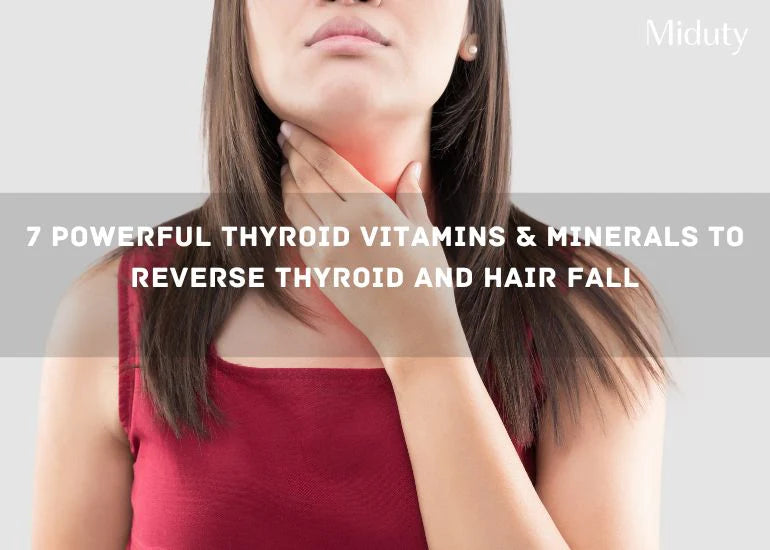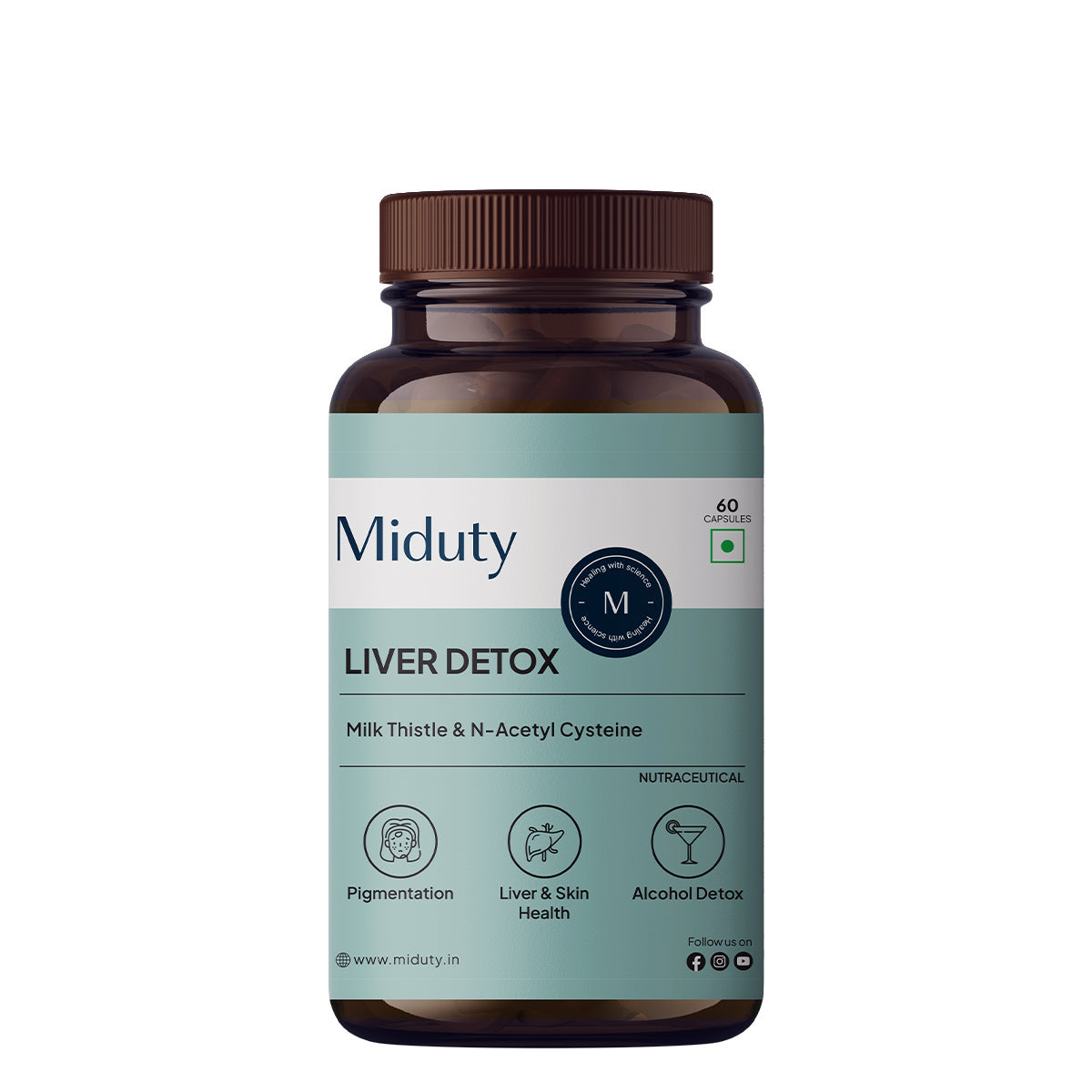
7 Powerful Thyroid Vitamins & Minerals to Reverse Thyroid and Hair Fall
 Share
Share
When you wake up in the morning or take a shower, do you notice that there is more hair now than usual? Isn't losing your hair a real pain?
Your self-confidence can be seriously affected by hair loss, which can make you feel as though you are losing a piece of yourself. Let's admit it, we all want stunning hair that attracts attention and leaves people in awe.
When you experience excessive hair fall, it's a warning sign from your body that your thyroid gland is not making enough thyroid hormones for normal functioning and that's a fact that none of us are even aware of. I know what you're going through because I was very close to witnessing thyroid disorder because my mother used to have a lot of symptoms from that. Trust me, this disorder led me to start a new research journey. Since the beginning, this issue has been close to my heart.
Now that you're thinking about it, you must be wondering how to get rid of these symptoms and maintain good thyroid health. Keep reading this blog till the end.
For some people, managing these symptoms of hypothyroidism involves more than just taking medications. Furthermore, have you ever wondered why these medications do not permanently ease our symptoms and address nutritional deficiencies? To control your situation, you must give your body enough vitamins and minerals to consume.
Our thyroid gland helps in the proper functioning of our metabolism in an essential way, and when it's not working properly, it can cause a variety of health issues such as hair loss, tiredness, mood swings and weight gain.
Vitamins and nutrients can benefit in the fight against the root factors of thyroid disorders, such as inflammation, as well as in the improvement of a poorly functioning thyroid.
Thyroid vitamins and minerals are a category of dietary supplements used to treat hypothyroidism, also known as an underactive thyroid.
However, it is vital to consider that no one should supplement with vitamins and minerals unless they are knowledgeable about the subject.
Let’s discuss 7 Powerful Thyroid Vitamins to Reverse Thyroid and Hair Loss
1. SeleniumSelenium is a nutrient that is essential for thyroid function. It greatly helps in the production of thyroid hormones T3 and T4, as well as the conversion of T4 to T3, the active form of thyroid hormone. Selenium also protects the thyroid gland against inflammation and promotes immunity. [1]
Selenium deficiency can cause a reduction in thyroid hormone manufacturing and affect thyroid function. Natural sources of selenium include foods.
There are two types of selenium: Organic and Inorganic. Our body uses 95% of organic selenium and 5% of inorganic selenium.
Selenomethionine is the organic selenium that is mostly present in the foods we consume. However, sometimes getting enough selenium through a diet is not always possible, especially when you are vegetarian.
Hence, a supplement of selenium is needed. Triple Thyroid Care is one such supplement that contains Selenomethionine along with other nutrients like Zinc and Ashwagandha.
Here are some great selenium food sources:
- Brazil nuts: Only just a few Brazil nuts can supply the daily recommended intake of selenium.
- Selenium is found in seafood such as oysters, tuna, sardines, and salmon.
- Meats such as chicken and turkey are also high in selenium.
- Eggs: Eggs, particularly the yolks, are high in selenium.
Vitamin D helps in proper functioning of the immune system and may help decrease thyroid gland inflammation, which can be beneficial to people with autoimmune thyroid disorders like Hashimoto's disease. [2]
Vitamin D also helps a lot with calcium absorption in the body, which is essential for bone health, and may play a role in thyroid hormone production regulation. Maintaining healthy levels of Vitamin D is mandatory for the people with thyroid in order to avoid further complications.

Sunlight is one of the most effective sources of D because the skin can begin producing vitamin D when exposed to ultraviolet B (UVB) radiation from the sun. An adequate amount of Vitamin D can help you with hair loss which is a common sign if you have a thyroid disorder.
Other dietary sources of Vitamin D include Salmon, Tuna, Egg Yolk, and Cheese.
3. Iodine

Iodine is one of the essential vitamins for thyroid, found in foods such as greek yogurt and seaweed. It plays a vital role in thyroid function. The soil in India is deficient in iodine, which has resulted in a large number of people experiencing iodine deficiency. [3]
A lack of iodine can cause thyroid gland inflammation, known as goiter.
Iodine is mostly found in seafood, and the majority of Indians are vegetarian, hence they don’t get enough iodine from dietary sources resulting in iodine deficiency.
Here’s a list of 5 Iodine-rich thyroid foods you should incorporate into your diet.
4. ZincZinc is extremely important for thyroid hormone metabolism; a zinc deficiency may result in decreased thyroid hormone levels and a slower resting metabolic rate. Zinc is a nutrient that supports the proper functioning of your immune function and metabolism. Zinc is required for the breakdown of the thyroid hormone T4 to T3. Zinc and selenium both help to improve thyroid function and hormone levels. [4]
Some foods which contain Zinc are:
Nuts and seeds include pumpkin seeds, lentils and beans, and vegetables like kale, mushroom, and peas.
5. Vitamin B1Do you know some B vitamins, in particular, have been found to be crucial for thyroid function? For example, vitamin B1 (thiamine) is associated with the transition of thyroid hormone T4 to its active form T3. It is one of the most important vitamins for thyroid.
Adequate vitamin B1 intake can thus try and support better and healthier thyroid function. [5]
Leafy green vegetables, nuts and seeds, and eggs, are all good sources of B vitamins.
To help overall health, including thyroid gland health, it is critical to consume a well-balanced diet rich in Vitamin B1.
6. L-TyrosineTyrosine is one of the amino acids that is required to build proteins, produce enzymes, and most importantly help in the production of thyroid hormones. L-tyrosine is its active form.
L-tyrosine acts as a basic foundation for your body's thyroid hormones. When you lack sufficient thyroid hormones, L-tyrosine may help your body produce more. TSH levels may be reduced by taking l-tyrosine supplements. [6]
Because tyrosine is a key component of thyroid hormones, supplementing it can result in more thyroid hormones. It is beneficial to people who have hypothyroidism.
7. Vitamin B12The thyroid gland is in charge of producing hormones that control metabolic activity, energy levels, and other important bodily functions. Vitamin B12 is necessary for the production of these hormones, as well as the thyroid gland's maintenance and restoration.
Vitamin B12 helps thyroid health by supporting the conversion of thyroxine (T4) to triiodothyronine (T3), the active form of thyroid hormone. This process is critical for keeping normal thyroid function and metabolic activity.
Vitamin b12 can help you fight weakness and low energy which are one of the common symptoms of Hypothyroidism. It’s a very common symptom while having thyroid gland dysfunction. Additionally, it can also help you if you feel cold all the time and have a tingling sensation in your hands and feet. [7]
Can Supplements Help in Reversing Thyroid Disorders?
While many people choose thyroid medication to address thyroid symptoms, it's important to keep in mind that this is only a temporary solution that has to be maintained throughout the lifetime. However, it is best to use supplements to fill in nutritional gaps and treat the root cause of your problem.
Thyroid supplements provide the body with the vitamins, minerals, and other nutrients it requires to support the best possible thyroid function. Because thyroid disorders are so common, there is a lot of research to back up many of these vitamins. Supplements can also help with other components of health that affect thyroid function but may not seem to have an obvious connection.
I've been very close to witnessing thyroid treatment as my mother was suffering from it, I have seen how my mother used to feel low, and at that time, no one knew why. I assisted her in reversing the condition, which required extensive research. This led me to create Triple Thyroid Care, which contains a combination of all the necessary nutrients like zinc, selenium, l-tyrosine, and iodine needed to keep your thyroid healthy. In addition, I've included KSM 66 Ashwagandha extract which works brilliantly to help with mood swings, lowering stress, and improve brain function.
Conclusion
In order to reverse your hypothyroidism, your lifestyle, nutrition, and level of stress should all be changed.
Vitamins for thyroid like iodine or vitamin D may help you on your path to hypothyroidism recovery as a result of these changes.
The best approach to get the vitamins and minerals required for optimal thyroid function is generally through a healthy diet that includes a variety of nutrient-rich foods.
Iodine, selenium, vitamin D, and certain B vitamins all play crucial roles in thyroid health and may even be required for healthy thyroid function.
References
[1] https://www.sciencedirect.com/science/article/abs/pii/S1521690X09000815
[2] https://www.ncbi.nlm.nih.gov/pmc/articles/PMC3921055/
[3] https://www.ncbi.nlm.nih.gov/pmc/articles/PMC4049553/
[4] https://pubmed.ncbi.nlm.nih.gov/16391573/
[5] https://www.ncbi.nlm.nih.gov/pmc/articles/PMC1264499/
[6] https://www.ncbi.nlm.nih.gov/pmc/articles/PMC292197/
[7] https://pubmed.ncbi.nlm.nih.gov/18655403/

